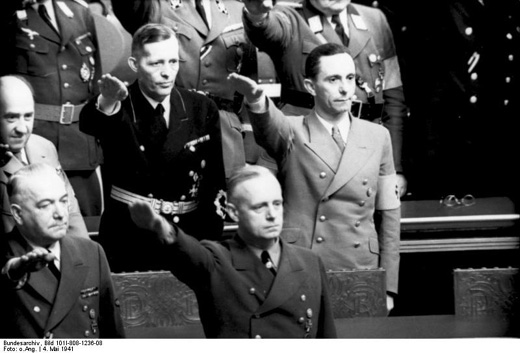Battle of the Atlantic
U-38 sinks the Swedish steamer Japan (5230t) from dispersed convoy OB-310 about 250 miles northwest of Freetown. All 54 crew members make it to French Guinea where they are interned by Vichy French authorities.
[The Blitz
Liverpool and Merseyside are hit in the fourth of seven consecutive night raids. (See May 7 for summary). Also a target this night is Belfast. 200 bombers drop 235 tons of high explosives and 96,000 incendiaries. Targets include the docks, the shipyards and the city center. Transport facilities and utilities suffer heavy damage resulting in disruptions in service. About 150 people are killed with about the same number injured. Industry and work in the docks is affected but production is restored in a short time.
[Britain, Home Front
Robert Menzies, the Australian Prime Minister, just before he leaves Britain for Australia, praises Britain's women: 'I confess myself an enthusiast about the superb women of Great Britain. In some of the great industrial cities where many hundreds of bombs have fallen, where thousands of houses had been wiped out, where vast community funerals had been held and human anguish must have been supportable only because it was so widely shared, the quickest recognition and the brightest smiles were seen on the faces of toil-worn middle-aged women; faces transformed from homeliness to a sort of radiant beauty by sheer courage. I thank God for such people.'
[Germany, Home Front
In a speech at the Reichstag Hitler claims that the entire Balkan campaign has cost the German only 5,500 casualties and by withdrawing troops from North Africa to Greece, Churchill has made the 'biggest strategic mistake in history'. He also says, 'In this Jewish-capitalist age, the National Socialist state stands out as a solid monument to common sense. It will survive for 1,000 years.'
Speech at Reichstag |
 |
Iraq
The main events are again British air operations. An airfield at Mosul which is being used by a small German force is one RAF target. The German force is receiving supplies from and via Syria with the cooperation of the Vichy authorities.
[Italian East Africa
The Italian forces around Amba Alagi are driven off 3 hills in the west of their position by attacks from the 29th Indian Bde.
[North Africa
Rommel halts his attack on Tobruk. The Germans will continue to hold the enclave in the perimeter that they have just won but will not be able to extend in at any time later in the siege. For both sides life at Tobruk settles down into a style not unlike the trench warfare of World War I. The ground is very hard, however, and this makes digging particularly difficuly so that trenches are often shallow at first. This means that their occupants must stay virtually motionless throughout the burning heat of the day. Neither side is well placed with regard to supplies or other personal comforts. Both sides soon adopt a policy of offensive night patrolling which means that there can be no relaxation.
Following this second failure to take Tobruk the Axis commanders consider a plan for reinforcing their forces in North Africa. The plan is to form an army of three corps, 2 Italian and 1 German, with 5 armored divisions, 7 motorized divisions and 4 non-motorized 'occupation' divisions. For the Italians alone this project would require the transportation to Africa of 100,000 ment, 14,000 trucks and 850 guns. This plan, however, is never put in place and the Axis forces in North Africa never achieve any of the numbers suggested in the plan.
[